- Home
- Sarah Price
The Faded Photo Page 3
The Faded Photo Read online
Page 3
Dr. Graham’s smile caught Frances off guard, and for just a moment she thought that all of this was a mistake. Certainly he had reviewed her file and studied the mammogram images. He had good news for her. He wouldn’t be smiling otherwise.
But just as fast as those thoughts went through her mind, she knew that it was just wishful thinking, something she wanted to hear: This was all a mistake, Frances and Sorry for wasting your time and causing undue alarm. However, she also knew that his smile and greeting were probably standard protocol for most doctors. Dr. Graham’s calm demeanor might not mean that everything was fine; in fact, she suspected that it might mean the opposite.
“Well, I suppose I’d feel a lot better if I knew why I was here,” she replied, hoping that her voice didn’t sound as edgy as she felt.
He leaned against the counter and sink, leaving his hands folded in front of him. A very nonconfrontational body language sign, she thought, wishing that she could feel optimistic but knowing that the reality of the situation was quite different. Optimism would have required a No need to worry, Mrs. Snyder; it’s just a precaution to send you to the surgeon from Dr. Steele’s assistant when she had called earlier. Pessimism was sitting here in a strange doctor’s office, waiting for him to explain the reasons for such an urgent appointment.
To her relief, he did not waste time in providing that answer.
“Your mammogram results came back, and Dr. Steele noticed an abnormality in your left breast.”
The lump.
She had first felt it six months earlier, back in May. It hurt when she touched it. She hadn’t thought much about it, especially since she wore only underwire bras, which she hated but never had time to replace. When she first felt the tiny lump under her left arm by the side of her breast, the wire had just broken free from the stitching and had been jabbing her. It wasn’t until Nicholas touched her one night and she winced from the pain that she realized it hadn’t gone away, even after she threw out the old bra.
“OK,” Frances responded to the doctor, forcing herself to remain calm.
“You’ve been having some pain there, too, yes?”
She nodded once.
“The mammogram also showed some puckered skin at the site, so we’d like to do an ultrasound, and then depending on how that goes, a biopsy.”
Biopsy?
“I’m prone to cysts,” she quickly pointed out.
This time it was Dr. Graham who nodded.
“I saw that in Dr. Steele’s notes.”
“It’s probably nothing, right?” She noticed a shadow cover his eyes. “I did research this morning while I was waiting. Breast cancer doesn’t hurt, right? So it’s probably just another cyst.”
Dr. Graham contemplated her question. He stared at her with light-grayish-blue eyes for a moment too long, and Frances felt that racing feeling in her chest again. Why hadn’t she thought to bring her Xanax? She hoarded them, always trying to talk herself out of using them until she felt as if her heart might explode. This, however, was the perfect moment to take one without feeling any guilt, and she had left them at home.
“Let’s see what the ultrasound says before ruling anything out, shall we?” he responded at last.
Without waiting for her reaction, he opened the door and called for an assistant to come into the room. Frances couldn’t even look at the woman who greeted her with a cheerful hello. Instead, she tried to find her inner place, the only place that she could retreat to when things became overwhelming. She focused on her breathing, feeling her chest rise and fall as the doctor told her to lie down. He was fumbling with a machine while his assistant flicked off the lights. She felt the doctor open the front of her pink paper gown and heard him ask her to raise her left arm over her head. With complete automation, Frances did as he instructed, still trying to steady the rapid rise and fall of her chest.
“You are going to feel something cold,” he said, just before he squirted something from a clear bottle onto what looked like a wide probe. The thick gel looked just like what her doctor had used when she’d gone for her prenatal checkups and in-office ultrasounds. “This won’t hurt at all, though,” he added.
Frances remained silent, staring up at the ceiling and feeling herself slip into a zone. She was no longer lying supine on an examination table with a doctor gently pressing the ultrasound device against her skin, moving it around with one hand as he pressed buttons on the machine with the other. Instead, Frances was . . . nowhere. She felt weightless and free, as if she were floating through the air. She heard a ringing in her ears, which helped drown out the noises from the machine.
After no more than five minutes, Dr. Graham shut off the machine, and his assistant stepped forward to gently wipe the gel off her skin. Frances anxiously stared at him.
“Stay there, please,” he instructed.
Dear God, she prayed. Please. Not me. Not now.
His assistant was rolling another cart from the far side of the room to the examination table. With her nerves on fire, Frances listened to the rattle of the metal wheels and then, once the cart was situated, to the sound of packages being opened and sterile utensils being laid out.
“Frances? You hanging in there?” Dr. Graham asked.
She turned her head, hating the noise of the crinkly paper coming from the table. “What did you see?”
He leaned over her so that she didn’t have to strain her neck. “I want to do that biopsy, Frances.”
Alarmed, she started to sit up. “What? Why?”
He pressed his hand to her shoulder and gently pressed her back onto the table. “It’s standard procedure when the ultrasound shows something suspicious, Frances. We try the noninvasive methods first, but if we cannot rule out what we are looking for, then a biopsy becomes necessary.”
She raised her hand to her forehead and shut her eyes. Dr. Graham began to explain what he was going to do, but she already knew. Earlier that morning she had read about biopsies, which were conducted when the other tests, such as the mammogram and ultrasound, couldn’t rule out breast cancer. A needle would be inserted into her chest—and into what Frances hoped would prove to be a benign cyst—to extract tissue cells. A lab would test them and return the verdict, which was either immunity or a death sentence. At least that was how it felt as she straddled the fence between the two.
“Now, we’re going to use the ultrasound as we perform the fine-needle aspiration. It will help guide us to the area in question,” he said. “I won’t lie and tell you that you won’t feel anything . . .”
She started to jump up again.
“But it’s only a slight pinch. I think most people are alarmed more at the idea than the actual feeling,” he continued.
This is not happening. This is simply not happening. She shut her eyes and covered them with her forearm, willing herself not to cry. But as she heard Dr. Graham talk to his assistant, using medical terms that she couldn’t quite understand, tears welled up through her eyelids.
The nurse pressed a tissue into her hand and tried to reassure her with some soft words that Frances didn’t even understand. Her mind was tuned into one thing and one thing only: a strange doctor whom, until just half an hour ago, she had never met was going to insert a needle into her breast.
All her life, Frances had been rather prudish when it came to her body. In fact, prior to meeting Nicholas, she had been with only two other men, one of whom she thought she was going to marry. When she began dating Nicholas, a full two years after the tumultuous breakup with Sam, she’d refused to engage in any form of intimacy until the engagement ring was on her finger and a date was set.
For some reason, that had not discouraged Nicholas; instead, it had provoked his passion even more.
After six months of dating, they were engaged, and it was another six months until they were married.
Now, regardless of the fact that Dr. Graham was a doctor, to have a stranger probing at her breast was almost an affront to her sense of propriety. Like a
tidal wave of mental angst, a dozen different thoughts crossed her mind: she should have told Nicholas the truth about the phone call, she should have asked for a female surgeon, she should have considered a second opinion of her mammogram records, she should have never been here in the first place. At least not without her husband at her side.
“Relax, Frances,” the female assistant said. “If it helps, you can squeeze my hand.”
“I don’t understand any of this,” she sobbed as she let his assistant take her left hand in hers, holding it tightly.
“You’re going to feel the pinch now,” Dr. Graham said in a soft voice.
Then she experienced the piercing sensation in her sensitive breast as it was penetrated by the needle. She cringed as every muscle tightened in her body, and then cried out as the pain didn’t stop. In fact, unlike the regular shots she used to receive as a child or the blood draws she sometimes got as an adult, the needle continued to burrow even deeper.
Catching her breath, Frances squeezed the assistant’s hand. She tried to think of something happy, to find a memory that would take her away from the current moment. But all she could think about was Mrs. Bentley and whether she had gone through something like this. It had been decades since she’d thought about that uncomfortable day when her mother made her pose next to their neighbor in that red sled for a Christmas photograph. More than thirty years is a long time when it comes to medical advances. Surely they didn’t have such technology back then, technology that, today, might have helped save Mrs. Bentley’s life.
“We’re almost done, Frances. You hanging in there?”
She tried to nod, but couldn’t. Instead, she murmured, “Mmm-hmm” to acknowledge his question.
After what seemed like another five minutes, but in reality was more like one, the doctor withdrew the needle and quickly put a bandage over the tiny puncture site. The assistant waited a few seconds before gently releasing Frances’s hand.
“That wasn’t so bad, was it now?” the woman asked.
More tears came to Frances’s eyes. The biopsy was over, and while just having had it was bad enough, she knew that worse things might be ahead. She couldn’t imagine losing her breast or going through chemotherapy. She knew she would have to pray to God that he take this cup away from her. She couldn’t go through with the emotional and physical upheaval that cancer would throw into her life. Cancer was something that God would just have to give to someone else.
The doctor left the room to give her some privacy while she changed back into her clothes. Her side hurt, and her head was pounding with a dull ache that she knew wouldn’t go away anytime soon. Stress had a way of doing that to her. And this was more stressful than anything she had been through before. Even worse, this time she had gone through it alone.
In hindsight, perhaps she should have told Nicholas. But she hadn’t known that the procedure was going to take place. She had thought she was meeting with the surgeon to discuss the mammogram results. But apparently they wanted to do the biopsy right after the ultrasound, which was more than worrisome, to say the least.
For a moment she paused. She knew very few women who had been diagnosed with breast cancer, an oddity in itself since at least one out of eight women get it, according to that morning’s hasty research on WebMD.com. Frances was relatively young; she had just celebrated her forty-second birthday less than a month ago. Most women seemed to get breast cancer at a much older age. She didn’t know anyone in her limited circle of friends and acquaintances that had gone through it. My God. Her fingers paused over the last button of her silk blouse. They wanted me to come so fast because they already know that I have breast cancer.
The door opened and Dr. Graham walked in. He had an appointment card and reached out to hand it to her. “Friday at nine o’clock you should come in so we can go over the results,” he said.
“You already know,” she whispered.
His expression faltered for just a quick second. And then he shook his head, never once losing eye contact with her. “We won’t know anything until the results come back, Frances.”
She narrowed her eyes, distrusting him for the first time that day. She reluctantly accepted the card and slid it into the side pocket of her purse. After all, what else could he have possibly said?
As she walked out of the medical building, she inhaled the crisp autumn air and sighed. She had about forty hours until she would return to learn the truth—whether or not she was right and Dr. Graham was just putting her through the motions because he already knew what the answer was. Frances, though, had to wait until Friday at nine, and it didn’t seem fair.
CHAPTER 3
“Cancer?” Despite being in public, Charlotte practically shouted the word, not caring if anyone overheard her.
In a panic, Frances started to wave her hands in the air and frantically glanced around, hissing, “Shh!”
Despite her attempt to quiet her friend, she saw that several people were already looking at them. They were sitting at a sidewalk table on South Street in Morristown, the restaurant overlooking the town square—the Green, as it was referred to. Being a late Thursday afternoon, and despite the fact that it was too late for lunch yet too early for dinner, all the outdoor tables were already crowded with people. Even though it was October, people tended to flock to the center of Morristown so they could enjoy coffee outside of Starbucks or a glass of wine at the numerous spots that offered outdoor seating on the extra-wide sidewalks. Ever since the real estate boom, Morristown had thrived and was now home to over fifty restaurants and bars.
Earlier that morning, and after much deliberation, Frances had texted her friend Charlotte, asking if they could get together in the afternoon. Simply put, Frances needed to confide in someone about everything that had happened in the past twenty-four hours. The memory of yesterday’s biopsy was still raw, and the countdown to tomorrow’s meeting, when she would hear the test results, kept her on edge. She needed a voice of reason, something that Charlotte Parker always had.
But she didn’t want the entire town to know about it.
“Keep your voice down,” Frances whispered.
Charlotte frowned and leaned forward, her black hair cascading over her face. Abruptly, she pushed it away, tucking a strand behind her ear. She was a pretty woman with deep chocolate eyes and perfect heart-shaped lips, which were currently pursed as she said, “You think you might have breast cancer, and you’re worried that someone might overhear me? Something is wrong with this picture.”
“I . . . I just don’t want anyone to know. Not until I know what’s going on.” Maybe she should have waited to tell her best friend. Unfortunately, ever since she’d left Dr. Graham’s office the previous day, she hadn’t been able to think about anything else. All night she had tossed and turned, switching between total optimism that the biopsy would be benign and complete pessimism that her doctors already knew the truth and were just going through the motions, unable to change the course of the cancer. The former thought tended to lose out to the latter, and after a fitful sleep, Frances realized that she needed someone to talk to. Now she was worried that she’d made a mistake.
Charlotte shook her head, a strand of her hair falling across her forehead this time and casting a shadow over her eyes. It helped Frances to not be forced to look into her best friend’s eyes. During their fourteen-year friendship, they had been through thick and thin. The one thing that Frances could count on was Charlotte’s brutal honesty. Sometimes it was a blessing, other times a curse.
“You’re kidding me, right? Please tell me you’re not serious!” Charlotte took a long deep breath and leaned back in her chair. “You aren’t going to pull one of your Carrie maneuvers, are you?”
Frances looked up and pursed her lips. “That’s just not fair. You know how Nicholas felt about having a second child. I had no choice but to wait to tell him.”
However, she knew that Charlotte wasn’t likely to accept her complaint. And since her friend was also nev
er one to keep her opinions to herself, Frances wasn’t surprised when Charlotte responded in a terse tone.
“What’s not fair is you taking on the world by yourself, Fran. This is complete baloney. You’ve gone beyond the call of duty, more than anyone should have to. Don’t play the stoic soldier on this one.”
Playing with the edge of her white cloth napkin, Frances stared at her untouched glass of chardonnay.
“It’s early yet,” she offered in a soft voice, still hoping that no one could overhear their conversation. Both she and Nicholas had grown up in Morristown. She never knew when someone might recognize her. “I’m probably jumping the gun anyway.”
“I see.” Charlotte drummed her fingers on the edge of the table, studying Frances’s face with a strong, steely gaze. “And Nicholas? What does he think about all of this?”
“Oh, I . . . well . . .”
“Mmm-hmm.” Charlotte then exhaled, a sound that reflected palpable frustration. She leveled her eyes at Frances. “You didn’t tell him, did you? Why am I not surprised?”
Definitely a mistake. “You know how he gets, Charlie.”
“No. No, I don’t,” she snapped back through clenched teeth. “And you know why? I’ll tell you why. Because you take everything upon yourself. You think you are Wonder Woman. You always have, too.”
This time Frances narrowed her eyes. “Again, not fair.”
“Sure. Right.” Charlotte reached for her beer and took a healthy swig before adding, “Sometimes you need to lean on someone else’s shoulders.”
When she set her glass back down, small droplets of condensation landed on the tablecloth. Frances watched as they spread out, creating a polka-dot pattern. Not one of them connected, and she couldn’t help but recognize the irony.
“Look, I’m telling you because I . . . I just don’t have anyone else to talk to right now.”
And that was the truth.

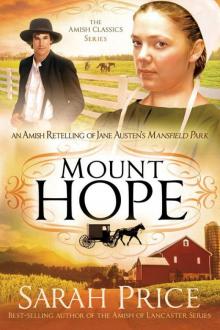 Mount Hope: An Amish tale of Jane Austen's Mansfield Park (The Amish Classics Book 5)
Mount Hope: An Amish tale of Jane Austen's Mansfield Park (The Amish Classics Book 5) An Amish Cookie Club Courtship
An Amish Cookie Club Courtship An Amish Cookie Club Christmas
An Amish Cookie Club Christmas An Amish Cookie Club Christmas (The Amish Cookie Club Book 2)
An Amish Cookie Club Christmas (The Amish Cookie Club Book 2) Sadie: An Amish Retelling 0f Snow White (An Amish Fairytale Book 3)
Sadie: An Amish Retelling 0f Snow White (An Amish Fairytale Book 3) The Amish Cookie Club
The Amish Cookie Club Ella: An Amish Retelling 0f Cinderella (An Amish Fairytale Book 2)
Ella: An Amish Retelling 0f Cinderella (An Amish Fairytale Book 2) Sense & Sensibility: An Amish Tale of A Jane Austen's Classic (The Amish Classics Book 4)
Sense & Sensibility: An Amish Tale of A Jane Austen's Classic (The Amish Classics Book 4)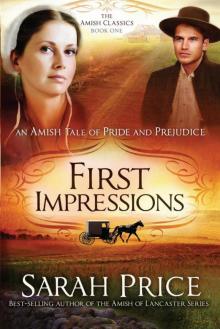 First Impressions: An Amish Tale of Pride & Prejudice (The Amish Classics Book 1)
First Impressions: An Amish Tale of Pride & Prejudice (The Amish Classics Book 1) Second Chances: An Amish Tale of Jane Austen's Persuasion (The Amish Classics Book 3)
Second Chances: An Amish Tale of Jane Austen's Persuasion (The Amish Classics Book 3) Newbury Acres: An Amish Christian Romance Novel: An Amish Romance Adaptation of Jane Austen's Northanger Abbey (The Amish Classics)
Newbury Acres: An Amish Christian Romance Novel: An Amish Romance Adaptation of Jane Austen's Northanger Abbey (The Amish Classics) Postcards from Abby
Postcards from Abby Plain Christmas (Plain Fame Book 6)
Plain Christmas (Plain Fame Book 6) The Matchmaker: An Amish Tale of Jane Austen's Emma (The Amish Classics Book 2)
The Matchmaker: An Amish Tale of Jane Austen's Emma (The Amish Classics Book 2) The Amish Cookie Club (The Amish Cookie Club Book 1)
The Amish Cookie Club (The Amish Cookie Club Book 1) Cowgirl Cat: A Humorous Novel About the Healing Power of Horses (Cowgirl Cat Series Book 1)
Cowgirl Cat: A Humorous Novel About the Healing Power of Horses (Cowgirl Cat Series Book 1) The Divine Secrets of the Whoopie Pie Sisters: The Complete Trilogy
The Divine Secrets of the Whoopie Pie Sisters: The Complete Trilogy An Amish Christmas Carol
An Amish Christmas Carol Hills of Wheat: The Amish of Lancaster
Hills of Wheat: The Amish of Lancaster Amish Faith: An Amish Christian Romance
Amish Faith: An Amish Christian Romance The Amish Seasons Collection: Contains An Amish Spring, An Amish Summer, An Amish Autumn, and An Amish Winter
The Amish Seasons Collection: Contains An Amish Spring, An Amish Summer, An Amish Autumn, and An Amish Winter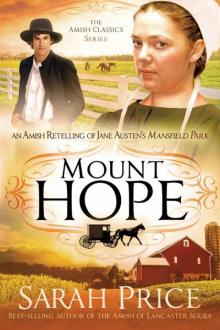 Mount Hope
Mount Hope Fields of Corn
Fields of Corn Fields of Corn: The Amish of Lancaster
Fields of Corn: The Amish of Lancaster Valley of Hope
Valley of Hope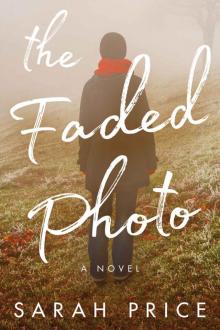 The Faded Photo
The Faded Photo The Amish of Ephrata Collection: Contains Four Books: The Tomato Path, The Quilting Bee, The Hope Chest, and The Clothes Line
The Amish of Ephrata Collection: Contains Four Books: The Tomato Path, The Quilting Bee, The Hope Chest, and The Clothes Line Pastures of Faith: The Amish of Lancaster
Pastures of Faith: The Amish of Lancaster An Empty Cup
An Empty Cup Sense and Sensibility
Sense and Sensibility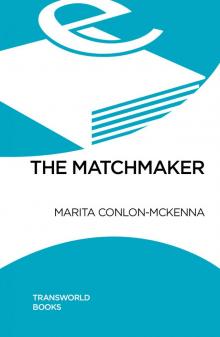 The Matchmaker
The Matchmaker Gypsy in Black: The Romance of Gypsy Travelers
Gypsy in Black: The Romance of Gypsy Travelers Second Chances
Second Chances Life Regained (An Amish Friendship Series Book 1)
Life Regained (An Amish Friendship Series Book 1) Secret Sister
Secret Sister Belle
Belle Plain Change
Plain Change Hills of Wheat
Hills of Wheat Plain Again
Plain Again Sadie
Sadie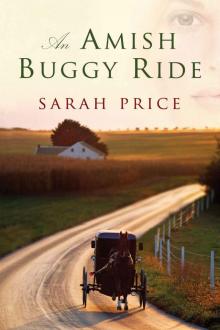 An Amish Buggy Ride
An Amish Buggy Ride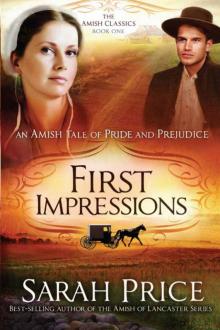 First Impressions
First Impressions Plain Fame
Plain Fame Valley of Hope: The Amish of Lancaster
Valley of Hope: The Amish of Lancaster Amish Circle Letters - the Complete Series
Amish Circle Letters - the Complete Series Pastures of Faith
Pastures of Faith